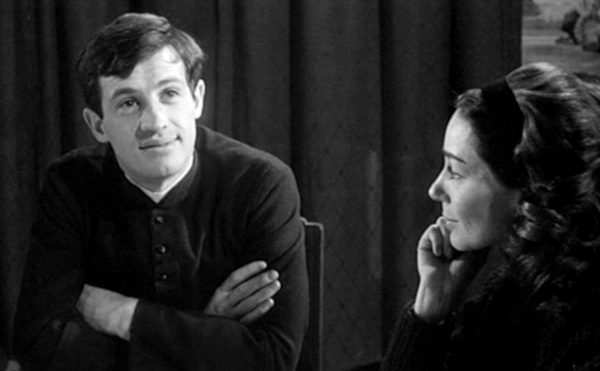|
Reviews of Recent Independent, Foreign, & Documentary Films in Theaters and DVD/Home Video

LÉON MORIN, PRIEST (1961)
The man of the cloth is Léon Morin (Jean-Paul Belmondo), and she returns to talk again with him. Or rather, to pontificate her own opinions and to illicit dialog, good dialog wherein he challenges her intellect. But soon these discussions with the priest, who she at first doesn’t really think of as attractive, take on another air altogether—she becomes a kind of masochist, and what were debates turn into something else—but will he allow it to go further? It’s surprising to see this kind of story in the hands of a filmmaker who, for the bulk of his career, spent his time making super moody and low-key crime films that are masterpieces of attitude (the solo hit man in Le Samourai and the methodical heist in Le Cercle Rouge). Aside from a morality story with lots of talk—another quality his films are not known for—the movie can still be seen as a Melville picture because it is mostly about attitude. With many bits of narration from Barny, Melville does a superb job getting inside the head of this woman, from her thoughts about the Occupation to a particular crush she has on a female co-worker. Also quite astonishing is seeing how Melville maintains the intensity and interest in the dialogue between Belmondo and Riva, scenes of great arguments that are about as lucid as anything seen in Bergman. This is in large part because what Léon Morin says is expressed with intelligence, tact, and a knowledge of the country and the world around him that surpasses that of the smart but over-analytical Barny, who takes the books Morin gives her as an excuse to just see him. Melville makes clear the young and handsome Morin more than likely knows his affect on women, and is something of a Don Juan, even if he doesn’t acknowledge it. Léon
Morin, Priest
has quite a lot going for it. Having directed the seminal occupation
film, Army of Shadows, Melville has the details of the time period
down pat, such as women having to baptize their children to cover up
their Jewish or Communist ties. And in Belmondo’s performance, we see
the amazing range of this actor. While the film’s never less than
fascinating, and those looking for religious semantics will not be
disappointed, the only downside keeping it from masterpiece territory is
a slightness to the storytelling—Melville tends to cut away from one
scene to another quickly, and the effect at most times is like flipping
through pages of a journal. It’s the only uneven flaw in the director's
attempt to express to the audience what it's to be in this woman’s
shoes. Jack Gattanella
|

